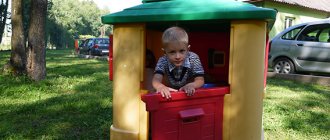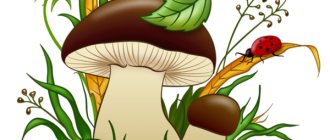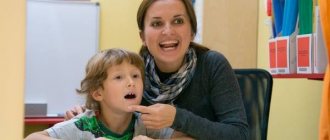Interesting sites.
|
Speech therapist for adults
|
Games for the development of phonemic awareness.
Didactic games in speech therapy work.
Games for the development of phonemic awareness.
Formation of phonemic hearing through play.
Games with sounds and syllables in the work of a speech therapist in senior and preparatory groups for children with ODD.
Sound games for children 4-6 years old.
Game “Rechtsvetik”
Didactic game “Make a word based on the first sounds.”
Didactic game “Fun Fishing” for preschool children (4-7 years old).
Didactic game for the development of phonemic awareness and fine motor skills “Beads for a doll.”
Didactic game “Who is the birthday boy today?” for children 6-7 years old.
Didactic lotto game “Where does sound live?” for children 6-7 years old.
Speech therapy games for the development of speech and non-speech mental functions within the framework of the lexical topic “Vegetables”.
How to properly develop attention and memory in children with mental retardation and alalia?
For games with non-speaking children toys ; at a higher level of speech development, pictures . This is necessary to create the appropriate emotional mood of the child and maintain interest.
- There are 4-6 toys on the table. The child turns away, and at this time 1-2 toys are removed. You need to turn around and find out what has been cleared from the table.
- You don’t have to remove, but add toys. The child’s task is to say what appeared on the table.
- There are from 2 to 4 toys on the table that you need to carefully examine with your baby. The child turns away, all the toys “hide.” We need to remember what was on the table.
- The child looks at 2-4-6 pictures from the children's lotto, then they are removed and mixed with the rest. The child’s task is to find the pictures that were looked at at the beginning of the game. A complication of the game is to arrange the pictures in the order in which they were viewed.
- Perform sequential steps : first you need to pour water into a cup, then put a spoon in a glass, and pencils in a box. A complication is to invite the child to talk about what he did.
- Finish the unfinished drawings , lay out a figure from the counting sticks according to the model.
Work of a speech therapist with a child with motor alalia - 5 main stages
Games for correcting sound pronunciation.
Speech therapy games to automate the sound “L”.
Presentation “Phonetic warm-up”.
Presentation with methodological support “The Tale of Funny Tongues”.
Articulatory gymnastics in verse.
Articulation gymnastics - finger theater “The Adventures of the Merry Tongue and His Friends.”
Complex of articulatory, finger and breathing exercises “Little Red Riding Hood”.
Articulatory gymnastics - the game “The Tale of a Cheerful Dwarf.”
Articulation gymnastics “Frogs”.
Didactic game - a guide to automating different sounds “Pyramid of Words”.
Articulation gymnastics-fairy tale “At Grandma and Grandpa’s.”
Articulation gymnastics - fairy tale “Birthday of the tiger cub Roar”.
Games for automating the sound "R".
Presentation game for sound automation [p] “Let's play with Ryzhik.”
Games for automating the sound "Z". (Games for automating sounds and developing phonemic processes in preschoolers with speech disorders.)
Game methods of work in the process of sound automation.
Game techniques in speech therapist classes.
Speech therapy game “Sea voyage”.
Speech therapy board game “Hissing Road”.
Subgroup game for consolidation and automation of sounds in spontaneous speech “Sound Tracks”.
Automating sounds using games. Tables for automating whistling and hissing sounds.
Didactic game - presentation on automation and differentiation of sounds “Help the elephant”.
Didactic game for automating sounds “Mishka’s Pictures”.
Didactic game for automation and differentiation of sounds [c] - [c'] “We’re going on vacation.”
Didactic game for differentiation of sounds [S]-[SH] “In a forest clearing.”
Exercises to prepare the articulatory apparatus for producing the sound L. Fairy tale “Tongue Walk”.
Using the “Electric Quiz” methodological technique in speech therapy.
Games for the development of coherent speech.
Development of coherent speech in children with special needs through didactic games.
Speech development of children with ODD in games. From work experience.
Game techniques for the development of dialogic speech.
Author's didactic games to expand the vocabulary of older preschoolers with special needs.
Games for the development of verbal vocabulary. (Formation of verbal vocabulary through a didactic game.)
Presentation game “Fruits and vegetables”.
Games and aids for the development of lexical-grammatical structure and coherent speech.
A comic poem - a game “The Journey of a Bug” on the use of prepositions in speech.
Didactic game “Travel around your hometown” (for children 6–7 years old).
Author's game "Russian Army" (for children 5-7 years old).
Didactic game “Who needs what?” for children 5-7 years old.
Didactic game “Dangerous objects in everyday life.”
Speech therapy game “Where and who do people work in our city?” for children 6 - 7 years old.
Didactic game “Hero Cities” for children 6 – 7 years old.
Author's didactic game for children 4-7 years old “Road Signs”.
Author's didactic game for children 5-7 years old “Who needs what for work.”
Didactic game “Find out and name the Orders of the Great Patriotic War” for children 5 – 7 years old.
The most effective games for developing fine motor skills
Preschoolers with motor alalia usually have poor coordination of movements and perform movements inaccurately and awkwardly. It is difficult for them to achieve graceful movements.
Fine motor skills of the fingers are especially affected.
To correct these shortcomings, you can perform the following exercises:
- Rise and fall from steps , stand on one leg, jump on both legs and on each in turn.
- Tie a knot, bow, fasten buttons.
- Bend and straighten the fingers on each hand alternately.
- Connect your thumb with the rest of your fingers one by one.
- Perform movements with and without demonstration: “fist-rib-palm.”
- Build towers from cubes , assemble pyramids.
- Pull the cord through the holes in various ways, string the beads onto the string.
- Squeeze and unclench the spray bulb.
- Lay out mosaic patterns.
A child has motor alalia - what should parents do?
Regularly conducted games and activities, careful fulfillment of the speech therapist’s tasks, and correct psychological support will certainly help the child rise to the next step on the path to mastering correct literate speech.
Games aimed at developing spatial gnosis.
Development and correction of perception of one’s own body diagram in preschool children with impaired spatial gnosis.
Formation of perception of relationships between objects and their groups in children in play.
Game techniques for developing the perception of spatial characteristics of objects (shape and size) and visual perception.
Formation of spatial relationships on the leading hand.
Game tasks for speech development and plane orientation.
Game “Colored boxes”.
Didactic game “My hometown” (for children 6-7 years old).
Leave your comment
Responsibility for resolving any controversial issues regarding the materials themselves and their contents is taken by the users who posted the material on the site. However, the site’s editors are ready to provide all possible support in resolving any issues related to the work and content of the site. If you notice that materials are being used illegally on this site, please notify the site administration using the feedback form.
All materials posted on the site were created by the authors of the site or posted by users of the site and are presented on the site for informational purposes only. Copyrights for materials belong to their legal authors. Partial or complete copying of site materials without written permission from the site administration is prohibited! Editorial opinion may be different from those of the authors.
Source of the article: https://infourok.ru/kartoteka-dlya-raboti-s-alalikami-chast-1843869.html
Other.
A set of didactic games “On the Path”.
Games for the development of the emotional-speech sphere.
Quiz game “Symbols of Russia” (preparatory group).
Didactic games for working in developmental groups. (preparatory group).
Multifunctional game “Cognitive envelope”.
Didactic game for differentiation of sounds [Ts] - [H]. “Peas”.
Didactic game “Say the Word” within the framework of the lexical theme “Autumn”...
Sound automation games.
The game is an exercise to enrich speech with words-attributes.
Games and exercises for developing students' speech.
Presentation Speech material - articulatory gymnastics with musical and text accompaniment "Song about the Merry Tongue Traveler."
Game - activity “Moving Pictures”.
Speech therapy manual for the development of phonemic perception and automation of sounds “Speech Laboratory”.
Phys. minutes at the sound automation stage..
Didactic game on automation and differentiation of sounds for children of senior preschool age, Lace and more.
Presentation “Use of games and exercises for the formation and development of prosodic components of speech in routine moments.”
Speech therapy game - presentation “Bread. Profession Baker."
Didactic games to automate the sounds R, L, Ch.
Multifunctional didactic manual for speech development SEASONS.
Game guide Young writer.
Intellectual games for children of the compensatory orientation group (CPG) 5-8 years old..
Speech therapy games “Help Cinderella”, “How much? What? (Who?)", "Greedy Bear".
Author's didactic game “Whose tail?”
Author's didactic game Hide and Seek.
Author's didactic game Who is the odd one out in the little house? .
Multifunctional educational and developmental correctional manual “Cubes-Changes”.
Author's didactic game "Kolobok's Journey".
Multifunctional game guide Magic paths in working with children with special needs.
The use of computer technology in speech therapy classes. Games and exercises for differentiating sounds [L]-[Y].
Useful materials on speech development for speech therapists, educators and parents.
Presentation “Use of games and exercises for the formation and development of prosodic components of speech in routine moments.”
Speech therapy facial massage in verse.
Proverbs and sayings, distributed by lexical topics.
Presentation “Speech material for sound automation [sh] based on Russian cartoons.”
Fedorenko T.G. Presentation “Travel around the country of Speech Therapy”.
Klemenova E.V. Exercises for automating the sounds R and L.
Belova E.V. Presentation “The importance of the level of development of children’s speech skills in school education.”
Shutova E.A. Presentation “Formation and development of prosodic components of speech through the use of a card index of games and exercises “Professions”.
Kurochkina T.A. Didactic manuals on the development of coherent speech using the method of visual modeling and schematization in the older group for children with ODD.
Vasilyeva O.L. Master class “Technology of work on the development and improvement of the technical and content aspects of reading in children with ODD.”
Ruzanova S.M. Poems for children of the senior speech therapy group for the final “Holiday of Pure Speech.”
Turochkina L.V. An original series of text material (for teaching retelling to children of senior preschool age).
Bondarenko O.N. Finger gymnastics “12 months” (author’s).
Muravyova N. Massage of hands.
Mitryasova D. Didactic game - presentation “Katya is going home. Sound K."
Kozlova L.N. Multifunctional speech therapy manual “Hedgehog”.
Shishlyannikova G.A., Strelkovskaya O.N. Workshop “Adults and children’s difficulties in learning to read and write.”
Kuznetsova M.V. Positive experience in preparing speech therapy notebooks for children and methods of working to correct sound pronunciation in children of the speech therapy group in kindergarten.
Lavrova G.N. Author's poems on lexical topics of the week, for educational activities with children with mental retardation.
Panshina T.A. Parents club “Steps to school”. Topic: “Thematic day as a form of development of child speech components.”
Vlasenkova V.I. Tongue twisters for automating the pronunciation of different sounds on the topic “Transport”.
|
Motor alalia. Exercises for parents (independent work)
One of the main indicators for determining motor alalia is the child’s intelligence. This is what doctors (neurologists and psychiatrists) write - initially preserved intelligence, and later - secondary reduced intelligence. Many parents of children with motor alalia are in vain reassured when the child is smart at 2-3 years old, understands everything, but just doesn’t speak. It is imperative to work with a speech therapist on speech development. And at the same time, independently develop the logic and intelligence of your child, preventing a stop in the development of the child’s mind until the very end of speech therapy classes. Because when there is a stop in the development of nonverbal intelligence, the process of speech development with a speech therapist slows down several times; it becomes extremely difficult to restart the development of logic, thinking, and intelligence in a child and this almost always leads to lifelong mental retardation and disability.
In simple terms, at 2 years old a child does not speak, a child is as smart as a 3-year-old child, at 3 years old he should be as smart as at 4 years old, and so on. This tendency must be maintained regardless of whether you work with a speech therapist or not, and continue until your speech is completely normal.
If the development of intelligence in a child with motor alalia stops at the age of 4, I immediately warn the parents who contacted me at this time that there is now little chance of a full normal. But, if non-speaking children with motor alalia come to me at the age of 4-5 with intact intelligence, I say that the chances of complete correction are more than 90%. To be clear: bringing a five-year-old non-speaking motor child to full normalcy is a miracle. If I hadn’t done this myself, I wouldn’t have believed that it was possible. My record is five years of non-speaking alalik to full speech in just a year. Usually, the later they arrive, the longer they study. In a year, I only bring 2-year-olds and less than half to the norm.
To develop intelligence, you can go in two ways. First: find a psychologist for the development of HMF (higher mental functions). We were unable to find a normal psychologist, although we looked at more than a hundred of them.
Second: independently engage in the development of your child’s intelligence. There is almost everything for this now: various construction sets, Legos, cubes, puzzles, cut-out pictures, pictures on the Internet with labyrinths, albums with pictures of animals, cars, etc., educational games on the Internet, educational clubs and baby clubs for the most little ones. Rules for classes on the development of intelligence: there should be a lot of classes during each day, when the child gets bored and the child gets tired, change one game to another. By the way, this is the only activity when a mother can sometimes take a break while the child plays what you have already taught him.
The advanced development of alalia's intelligence makes it possible to eliminate dysgraphia, dyslexia, and acalculia after leaving alalia. It is easier to prevent these speech disorders than to correct them over the course of 5-10 years with a speech therapist. The children of my parents, who are engaged in the development of logic, thinking, intelligence, knowledge, after my classes, have 4-5 performance in school.
IMPORTANT
It must be remembered that children with motor alalia during correctional speech therapy work require a special approach according to their speech, intellectual and physical age.
- requirements for a child in speech based on the level of his speech development (OSR level), that is, there is no need for a 3-year-old child ONP 1 - 30 words to be forced to recite poems about a Christmas tree, assignments will be given by a speech therapist.
- physical and mental development must correspond to his actual age. That is, you need to physically develop like an ordinary, healthy 3-year-old child. Educational requirements must be without any concessions to speech. As soon as parents begin to feel sorry for alalia and follow his lead, a child with alalia immediately begins to intensely resist the development of speech. A special attitude towards a child with motor alalia makes him a special mental disabled person. This is a very difficult process for parents. You can read my recommendations here.
- It is necessary to develop intelligence and understanding one year ahead of time. That is, we teach a 3-year-old non-speaking alalik like a 4-year-old healthy child, we use speech with him as with a 2-year-old, and the requirements for physical development and behavior are for him as for an ordinary 3-year-old child.



